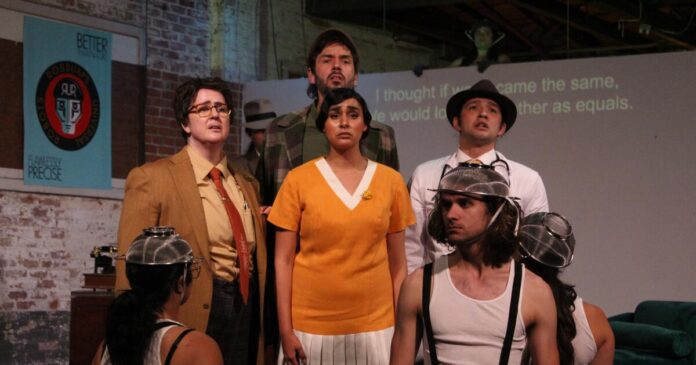When Karel Čapek wrote his play “Rossum’s Universal Robots” in 1920, the battle against machines replacing human labor had been fought for more than a century, with humans invariably losing.
Now, more than 100 years later, L.A. composer Carolyn Chen has updated the play for her opera “The Robots.” The quandaries she raised in Project BLANK’s production at Bread & Salt in Logan Heights on Saturday demonstrated the profundity and timeliness of Čapek’s insights. In 2024, we worry about the threats of artificial intelligence taking away jobs or the danger of autonomous mechanical soldiers.
However, her score never rose to the level of her libretto. At times dependent on overly repetitious chord progressions, at others undermined by aimless harmonies, the music of “The Robots” frequently seemed more like a workshop production than a world premiere.
Some composers make a virtue out of limited means. Think of Stravinsky’s seven instruments for “The Soldier’s Tale” or Walton’s meager pit band in “Façade.” Chen’s score cried out for a larger ensemble than string trio, electric keyboard, electric bass, and drums.
Leah Bowden is a fine drummer, but she seemed handcuffed by Chen’s simple drum set part. It’s unclear if Chen meant for the part to sound robotic, or if she didn’t understand how to turn a drummer loose.
The vocal writing and accompaniment could have done more to differentiate the human from the robot characters, never mind differentiating between the humans. However, it was an inspired decision to make the character of Mr. Domin, the CEO of Rossum’s Universal Robots, a trouser role for mezzo-soprano Leslie Ann Leytham. Leytham brought whimsy and optimism — or was that con artist charm? — to Domin along with her secure tone and intonation.
Despite the score’s deficiencies, the vocalists were on top of their parts and spot-on in their roles.

A scene from Carolyn Chen’s opera “The Robots” presented by Project BLANK at Bread & Salt in Logan Heights.
(Courtesy of Gabriela D’Amico)
As the ingénue Helena, soprano Mariana Flores-Bucio had a lilting voice, nowhere more so than in her Act II aria, “Was I wrong?,” which gave her a chance to open up and soar.
Baritone Jonathan Nussman portrayed Mr. Alquist, the Facilities Manager who becomes the last surviving human after the robot revolt. His singing was confident, especially poignant in his prayer “All Go Away” which utilized his highest register.
In the two solo robot roles, contralto Danielle Perrault sounded a little light in her low tessitura, but her stage presence was convincing; bass Shelby Condray rumbled ominously as Radius, the leader of the revolt.
Tenor Miguel Zazueta-Cervera’s voice impressed and baritone Paul Young, Jr. ably leaped back and forth between falsetto and chest voice.
Victoria Petrovich’s set was minimal but useful, but some of Rosie Glen-Lambert’s direction struck me as wrong-headed, nowhere more so than in a supernumerary robot’s contemplation of male reproductive parts. (Čapek’s robots would be more accurately called “androids” today, being built of flesh and blood.) The robots have no desires, so why would the budget-conscious company spend money to endow them with packages? And if the robots have no taste, why do they prefer to wear colanders on their heads?
Kyle Adam Blair was the able conductor, doing the most with what Chen provided him.
It was heartening to see Saturday sold out — as were the run’s other two performances. I think there’s ultimately a good opera in “The Robots,” but it will require some musical revisions.
Hertzog is a freelance writer.



